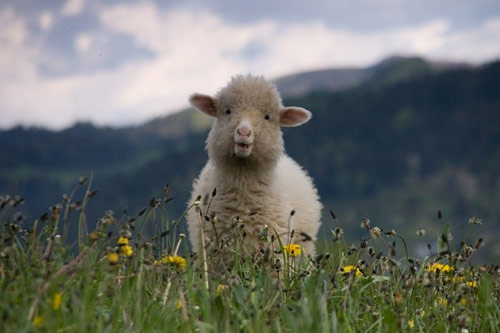|
查看原文
Some people are born lucky. Parents in China, however, would rather not leave their kids’ fate to chance.
For the past few weeks, many couples have been trying desperately to conceive, racing against time to have a baby in the fortuitous Year of the Horse. Their reasoning: No one wants a baby born in 2015, the dreaded Year of the Sheep.
Sheep are meek creatures, raised for nothing more than slaughter. Babies born in the Year of the Sheep, therefore, will grow up to be followers rather than leaders, according to some superstitions. The children are destined for heartbreak and failed marriages, and they will be unlucky in business, many Chinese believe. One popular folk saying holds that only one out of 10 people born in the Year of the Sheep finds happiness.
Health professionals say fertility consultations have spiked in recent months. Some doctors even have expressed worries that there may be a corresponding jump in abortions later this year, as couples realize they missed the horse-year cutoff.
According to the Chinese lunar calendar, the Year of the Sheep (also called goat or ram) begins Feb. 19, 2015, so the window for conception closes around the end of this month.
Many patients have inquired about early delivery via Caesarean section to ensure a horse-year birth, said Li Jianjun, an obstetrician at Beijing’s United Family Hospital.
Some doubt the furor will have a significant effect on the Chinese birthrate this year. But the babymania is so widespread that the state-run China News Service issued a report trying to debunk the “unfounded” myth of bad luck for those born in Year of the Sheep.
“We try our best to dissuade couples from believing the sheep superstitions,” one official at China’s Center for Disease Control and Prevention said. The woman, who spoke on the condition of anonymity because she was not authorized to give an interview, said the subject has become such a prominent issue that it is often addressed in classes for would-be parents.
But the medical professionals do not have an easy sell. The official said that even her colleagues at the disease-control center are obsessed with the supposed luck a horse year brings.
‘All that pressure’
It’s unclear how the Year of the Sheep came to acquire its bad reputation.
Each of the 12 animals in the Chinese zodiac has it virtues and faults. The undisputed favorite is the dragon, often followed by the tiger and the horse — an energetic animal closely associated with success, according to Chinese sayings.
Even rats (considered clever and agile) and snakes (which look like mini-dragons) are considered lucky. But sheep have fewer advantageous qualities, according to some interpretations.
Those born in sheep years are thought of as passive, loyal, generous and kind. Some of those virtues may be wonderful in an ideal world, but not so useful in the dog-eat-dog real world.
“It’s an unfair and outdated superstition,” said Dong Mengzhi, 74, honorary president of Beijing’s Folk Literature and Art Society. “But it’s a convenient way for many to explain an unpredictable world.”
Unfair or not, one of the first things Zhang Xiaolei’s parents did when she got engaged in 2012 was to sit down with a Chinese zodiac calendar.
“We all agreed to hurry up and avoid the sheep,” said Zhang, 26, a government worker in Shangdong province.
Her husband quit drinking and started exercising in an effort to increase his fertility. Zhang went on a diet and got more sleep. But after a year and half of trying, nothing.
“I don’t know what happened,” she sighed. “Maybe it was all that pressure.”
She and her husband — both born in a dragon year, the luckiest of all — have consoled themselves with the hope that, if they do conceive later this year, their baby will be that one lone sheep in 10 to find happiness.
Others who fear they will miss their window have flocked to support groups that have sprung up online.
Boom periods
While demographers acknowledge the Chinese zodiac’s cultural importance, some have thrown cold water on the idea that it affects birthrates on a national scale.
Some Chinese provinces and hospitals have at times shown increases in births during lucky animal years and decreases in sheep years, but there is no discernible effect on national demographics, according to Duan Chengrong, a population expert who in 2003 published one of the only studies available on the phenomenon.
“It doesn’t mean it isn’t a factor,” he said by phone last week. “But its effects are likely diluted and overshadowed by others.”
Among the factors that have affected China’s birthrate in recent decades, and complicated the interpretation of such data, are political and economic upheaval and the government’s one-child policy.
In other countries, demographers have also grappled with theories of baby booms linked to specific events.
In the United States, for example, New York newspapers famously announced a boom in pregnancies after the massive blackout of 1965, during which couples supposedly had nothing better to do than procreate. But such a phenomenon was debunked in later years by population experts.
For those in China most schooled in the mystical arts of fortunetelling, all this attention to the Chinese zodiac calendar year is wasted.
“Ordinary people only care about the zodiac because it is much easier to understand than the truth. To us true feng-shui masters, the zodiac doesn’t matter at all,” said Wen Chaoliang, 39. “What matters most isn’t the year you are born but the exact time of delivery.”
Feng shui is the ancient art of arranging objects or numbers to improve luck.
For $500, Wen said, he has been helping couples pick the most fortuitous hours for their planned C-sections-.
For an extra $130, he throws in a lucky name. For $3,000, he will rearrange your home’s furniture to ensure the best possible future for your child.
“Don’t you want your baby to be successful? Don’t you want your baby to be healthy and beautiful?” he said. “Think about it. Isn’t it worth it?”
|
查看譯文
據(jù)《華盛頓郵報(bào)》報(bào)道,有些人生來(lái)就是幸運(yùn)的���,然而中國(guó)的父母?jìng)兛刹幌雰H憑機(jī)遇來(lái)決定他們孩子的命運(yùn)�。
過(guò)去幾周內(nèi),許多夫妻拼命努力地嘗試受孕�����,爭(zhēng)分奪秒地想要在幸運(yùn)的馬年生下一個(gè)寶寶����。他們的理由很簡(jiǎn)單:沒(méi)人想在可怕的羊年要小孩。
羊是一種溫順的動(dòng)物�,養(yǎng)著就是為了長(zhǎng)大后宰掉吃肉的。按照一些迷信的說(shuō)法�,羊年出生的小孩長(zhǎng)大后會(huì)像溫順的羊一樣永遠(yuǎn)只能追隨別人、永遠(yuǎn)都成為不了領(lǐng)袖�。很多中國(guó)人認(rèn)為,羊年出生的孩子注定要遭受痛苦的心碎����,失敗的婚姻和生意上的霉運(yùn)。其中一個(gè)流傳甚廣的民間說(shuō)法是在十個(gè)羊年出生的人中只有一個(gè)能找到幸福����。
健康專(zhuān)家表示����,近幾個(gè)月的生育咨詢數(shù)量大增����。有些醫(yī)生甚至擔(dān)憂年末會(huì)有大量的夫婦因錯(cuò)過(guò)馬年生育而選擇墮胎。
根據(jù)中國(guó)農(nóng)歷日歷����,羊年(亦稱(chēng)山羊或綿羊年)從農(nóng)歷2015年2月19日開(kāi)始����,所以今年要想趕上馬寶寶的末班車(chē)就要在本月月末懷孕。
北京和睦家醫(yī)院產(chǎn)科醫(yī)師李建軍表示����,很多夫婦都詢問(wèn)過(guò)可否通過(guò)剖腹產(chǎn)以提前在馬年產(chǎn)下孩子。
有些人認(rèn)為這種“馬年趕著生小孩”的狂熱會(huì)給今年中國(guó)的出生率帶來(lái)巨大影響��。這種過(guò)度狂熱����、且大幅傳播的“嬰兒潮”促使官方的中國(guó)新聞社專(zhuān)門(mén)發(fā)表了一期報(bào)道,以揭穿“羊年生的小孩走霉運(yùn)”這種“毫無(wú)根據(jù)”的民間傳說(shuō)�。
中國(guó)疾病預(yù)防控制中心一名不愿透露姓名的女官員表示��,“我們正盡力規(guī)勸夫婦不要相信所謂的羊年迷信��?�!彼硎?,關(guān)于羊年的迷信已經(jīng)成為一個(gè)很?chē)?yán)重的問(wèn)題�����,甚至很多時(shí)候需要專(zhuān)門(mén)的課程來(lái)幫助“準(zhǔn)父母”們?cè)谶@方面答疑解惑�。
但醫(yī)務(wù)人員不容易。這位官員說(shuō)��,即便是她在疾病控制中心的同事�,也對(duì)這種馬年好運(yùn)的說(shuō)法深信不疑。
“全都是壓力”
沒(méi)有人清楚羊年霉運(yùn)的臭名是從哪里得來(lái)的��。
中國(guó)的十二生肖各有優(yōu)缺點(diǎn)�����。最受人們喜愛(ài)的生肖當(dāng)屬龍�����、虎和馬,因?yàn)楦鶕?jù)中國(guó)的民間說(shuō)法�����,這三種充滿力量的動(dòng)物往往會(huì)帶來(lái)成功�。
即便是老鼠(通常被認(rèn)為是聰明和靈巧的)還有蛇(看起來(lái)像是一條小龍一樣)都被認(rèn)為是幸運(yùn)的生肖。但就一些對(duì)生肖的解讀而言�����,羊的優(yōu)點(diǎn)卻寥寥無(wú)幾�����。
羊年出生者通常被認(rèn)作是被動(dòng)���,忠誠(chéng),慷慨和善良的人�。這些品德在理想的世界里或許是美好的,但在“狗咬狗”的現(xiàn)實(shí)世界中卻沒(méi)什么用途����。
“這是一個(gè)不公平的、過(guò)時(shí)了的迷信��,”74歲的北京民間文藝家協(xié)會(huì)名譽(yù)主席董夢(mèng)知說(shuō),“但是對(duì)很多人而言�,這是一種便于用來(lái)解釋不可預(yù)知世界的方法?��!?/p>
不管這個(gè)生肖的說(shuō)法公不公平���,張小蕾2012年訂婚時(shí),她父母首先做的事情就是坐下來(lái)仔細(xì)地研究中國(guó)的黃道日歷����。
“我們都想要快點(diǎn)生孩子,避免趕上羊年��?��!?6歲的山東省政府工作者張女士說(shuō)�。
她的丈夫戒酒同時(shí)也開(kāi)始了鍛煉�����,努力提高生育率���。張女士也開(kāi)始節(jié)食并且增加了睡眠�。但是經(jīng)過(guò)一年半的嘗試之后,張女士還是沒(méi)有懷上孩子�����。
“我不知道怎么回事�,”張女士嘆息道,“可能都是迷信帶來(lái)的壓力�����?����!?/p>
張女士和她的丈夫都出生于最幸運(yùn)的龍年����,他們安慰自己“如果在今年后段懷孕��,他們的孩子一定會(huì)是十個(gè)羊年生人中的可以找到幸福的那一個(gè)”�����。
其他擔(dān)心錯(cuò)失生育良機(jī)的夫婦紛紛蜂擁向迅速涌現(xiàn)的在線支持組尋求幫助����。
繁盛時(shí)期
雖然人口學(xué)家承認(rèn)中國(guó)十二生肖文化的重要性�,有些人還是向這種文化潑來(lái)了冷水��,因?yàn)樗麄冋J(rèn)為這種文化影響了全國(guó)人口的出生率����。
根據(jù)人口學(xué)專(zhuān)家段成榮所言,雖然中國(guó)的一些省份和醫(yī)院的新生兒出生數(shù)屢次在幸運(yùn)生肖年和羊年之間起落����,但是它對(duì)國(guó)家人口卻沒(méi)有什么明顯的影響。段成榮先生在2003年出版了對(duì)這一現(xiàn)象研究?jī)H有的幾部可用專(zhuān)著之一����。
“這并不意味著生肖迷信沒(méi)有影響,”他在上周的一次電話通話中說(shuō)����,“但這種迷信的影響可能被其他因素的影響給淡化或者掩蓋了?!?/p>
在近幾十年來(lái)影響中國(guó)人口出生率的因素中,使這些數(shù)據(jù)很難解讀的一大部分原因就是政治經(jīng)濟(jì)動(dòng)蕩和獨(dú)生子女政策�����。
在其他國(guó)家,人口統(tǒng)計(jì)學(xué)家還堅(jiān)持著嬰兒潮與特定事件有關(guān)聯(lián)的理論��。
比如在美國(guó)���,紐約的報(bào)紙?jiān)?����,?965年大規(guī)模停電后���,懷孕者數(shù)量大增,因?yàn)樵谶@期間夫婦可能除了生育之外沒(méi)有什么其他可以用來(lái)消遣的事情了����。但在一些年后,人口專(zhuān)家揭露了這種現(xiàn)象的真實(shí)原因���。
對(duì)于中國(guó)那些精于算命的人而言�,所有對(duì)中國(guó)生肖日歷年的關(guān)注都是徒勞的����。
“平常人僅僅關(guān)注生肖而非真理是因?yàn)樯じ雍?jiǎn)單易懂�����。對(duì)我們而言真正有影響的是風(fēng)水,而非生肖��,”39歲的文超良說(shuō)����,“對(duì)你命運(yùn)真正有影響的不是你出生的年份而是你出生的具體時(shí)間?����!?/p>
風(fēng)水是一種通過(guò)合理安排物品或數(shù)目來(lái)提升運(yùn)勢(shì)的古老藝術(shù)���。
交五百美元�����,文超良就會(huì)幫助夫婦挑選最幸運(yùn)的時(shí)間進(jìn)行剖腹產(chǎn)�����。
再交130美元�,他就會(huì)給孩子起一個(gè)交好運(yùn)的名字。交3000美元��,他就會(huì)重新安排你家具的位置�,以確保孩子最優(yōu)秀的未來(lái)發(fā)展。
“你不想讓你的孩子成功嗎���?你不想讓你的孩子健康可愛(ài)嗎�����?”他說(shuō)�,“認(rèn)真考慮考慮吧���,這不是很值得的交易嗎�����?”
(譯者 劉思奇 編輯 丹妮)
掃一掃��,關(guān)注微博微信
 
|


